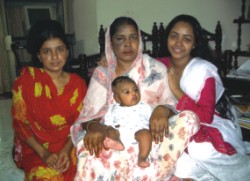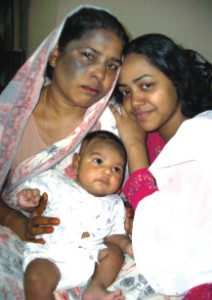| Perceptions
A Fortunate Exception
Ashna Ali
 |
Aisha, Hasina, Najma and Nehal. |
Live-in domestic help is a fact of middle-class life in Bangladesh. Homes are built with servants' quarters under the assumption that families living in homes in certain areas require domestic help. They are the silent wheels upon which middle-class life runs, but often they are silent for lack of a voice rather than the need to be heard. Abuse of domestic help is as common as their existence in the average home. The stories and examples of servants who are beaten, assaulted, verbally and emotionally abused and neglected are endless. The rights of the men and women who work for families still remain in the hands of those who hire them despite recent attention to the problem of abuse, and their fates remain behind closed doors. The behaviour of adults influences the behaviour of children in the treatment of domestic help, creating a vicious cycle of mistreatment and the class-based prejudices inherently result. Examples of adults whose children learn to call servants names, hit them or make unreasonable demands are also endless. There are rare examples however, of the exact opposite.
Hasina Begum, a woman from Jessore has worked for seventeen years in the home of two medical practitioners and their three children. Due to their time-consuming professions, the parents are often absent during the day, leaving the children in under their home workers care. One would expect havoc and abuse, as children with the right to make demands often cause. Instead, Hasina claims that the presence of children's sprightly tumult is the primary reason she has so happily lived and worked for this family. “If the children weren't here, I couldn't live here. I left my own daughter in Jessore, and immediately had to take care of a little girl and a newborn boy. I put one child down and picked up two more, and soon my own was playing with them when she could come to Dhaka. They're my children as much as my own, and I never felt that my child was treated as anything less than a sibling.”
 |
A Happy Family. |
The children of the household are now 20, 16 and 13 years of age. They all carry fond memories of Hasina and her daughter, Najma, growing up with them, and often reminisce with them about family antics of times passed. “I call my employers Bubu and Bhaiyya, terms of closeness, because that affection is there. I feel that they are my guardians, my parents. Bubu delivered my daughter's child.” As she spoke to me, Nehal, a child of barely two months lay fast asleep lying on the doctors' bed as his mother stroked his head. Najma said almost tearfully, “I worked as a nurse for a while, and I had my choices for doctors who could deliver my child. One would think that I would be afraid to have my mother's employer, but it gave me a sense of great security. People are scared of her temper, but we've never experienced it. I was a patient like any other patient. She's blind to those differences. When she comes home she coos at him and tickles him, and her daughter calls herself his khala, buys him things and cuddles him. He's spoiled with love, and in this house, it is not surprising. I lost my father and never had my own home, but I never felt that way here.” Living with them is another woman in her early twenties, Aisha, who has worked for roughly under two years in the same home. “I have a great time, actually.” She said. “The kids play around, we play with the baby, we watch TV. They tease me and I can tell it's the same way any sibling of mine would. I'm happy and safe. It's usually more likely that we wind up mistreated. We're lucky.” I watch as the employer's daughter scoops up the baby and coos as it, kissing it softly on the head, and Hasina Begum tells a story of how when the middle child was going through exams a month ago, he would call her to his room and ask her to hold his hand as he revised a few hours before leaving the home, for the comfort that he drew from her presence.
These play the roles of mothers, sisters, grandmothers and have workers simultaneously. Not all households are able to integrate their workers in to the family, and instead relegate them to their own quarters and servant-specific roles. Abuse of domestic workers is more often than not overlooked as a common-place reality of life in a country where social classes live together in close proximity while the differences between them are starkly delineated and retained. Lines and boundaries are essential to any household regardless of the relationships in question, but the delineations in this home seem to be defined by professional rather than class-related rules of conduct. The problem of class judgment grows out of proportion and into abuse when the humanity is an afterthought to pride. Though exams of abuse do and will continue to exist, examples of integration and harmony should grow from exceptions to commonplace behaviour, to create a middle-class society that is concerned about the security and happiness of those in their home. In turn, this could give voice and security to a working class whose voices are muffled when they deserve respect and appreciation for the essential roles they play.
Copyright
(R) thedailystar.net 2007 |
|
